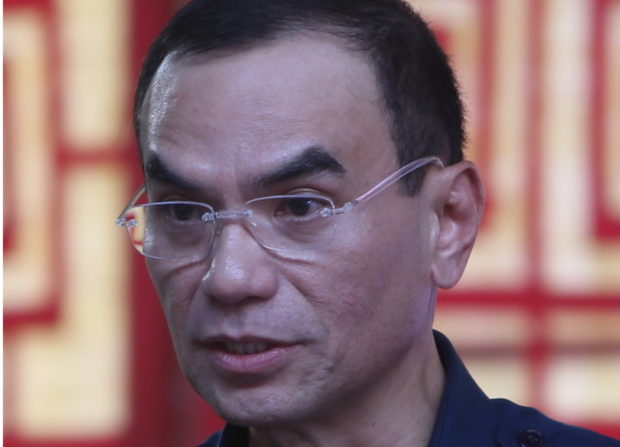PNP chief backs ‘tokhang’ vs communists

PNP chief Gen. Guillermo Eleazar (File photo from Philippine Daily Inquirer)
MANILA, Philippines — It took less than a day for Philippine National Police chief Gen. Guillermo Eleazar to change his tune from expressing concern to supporting the revived “tokhang”-style of weeding out leftists and communists in the Cordillera region.
In an updated statement on Tuesday night, Eleazar said the PNP “appreciates” the effort of the Cordillera Regional Peace and Order Council (RPOC) in implementing the “dumanun makitungtung” (Ilocano for visit and discuss) strategy.
“On the part of the PNP, we will provide assistance in a way that will strike a balance between our collective goal of defeating the [communist rebels] and our commitment to respect and uphold the basic human rights of every Filipino,” he added.
Eleazar ordered Brig. Gen. Ronald Lee, Cordillera police director, “to coordinate” with the RPOC to help in implementing this new tactic.
In an earlier statement, Eleazar cautioned the RPOC on its new policy, saying it might violate human rights.
Article continues after this advertisement“While I understand the genuine intention of the (RPOC), I believe that there are some gray areas in this campaign that may compromise the commitment of your [PNP] to respecting and upholding the human rights of every Filipino citizen,” he said.
Article continues after this advertisementHis previous directive to Lee was “to explore other ways in dealing with communist insurgency in the region” in partnership with the RPOC.
The Inquirer tried to reach Eleazar on his turnabout, but he had yet to respond on Wednesday night.
House visits
The RPOC is composed of heads of various government departments, offices and agencies in the region. It is chaired by Baguio City Mayor Benjamin Magalong, while the regional police director serves as vice chair.
The Department of the Interior and Local Government on Monday said the Cordillera RPOC passed a resolution adopting the dumanun makitungtung strategy to known members of left-leaning organizations to help address the five-decadeslong armed struggle of communist rebels, led by the Communist Party of the Philippines (CPP), its armed wing the New People’s Army (NPA), and its political arm, the National Democratic Front of the Philippines (NDFP).
The Anti-Terror Council designated the CPP, NPA and NDFP as terror groups. However, mere affiliation to leftist organizations is not a crime, even under the anti-terror law.
The RPOC adopted the Cordillera Regional Law Enforcement Coordinating Council (RLECC) Resolution No. 6, series of 2021, “enjoining the members of the law enforcement agencies together with the representatives of local government units, religious sector and [nongovernmental organizations] to conduct dumanun makitungtung strategy to known members of communist front organizations.”
Under the strategy, authorities would conduct house-to-house visits to those they perceive as members of communist organizations and persuade them to stop dealing with or supporting them.
In March, the Cordillera RPOC junked Resolution No. 4 of the Cordillera RLECC, allowing the police to enforce the antidrug strategy tokhang against activists, government employees and media workers suspected of supporting left-leaning groups.
Tokhang, coined from the Visayan word “toktok” (knock) and “hangyo” (persuade), directs lawmen to seek out illegal drug traders and ask them to turn their backs on their criminal activities.
“Oplan Tokhang” was the other component of PNP’s “Oplan Double Barrel,” the blueprint of the Duterte administration’s war on illegal drugs. It aims for the surrender of small-time drug dealers, while “Oplan High-Value Target” goes for the “big fish” in the illicit trade.
‘Repackaged’
But the tactic has also been associated with the deaths of thousands of drug suspects, especially the poor, during police operations or by unidentified assassins which the United Nations Human Rights Council is investigating.
In Baguio City, several groups condemned the new anticommunist strategy that would be enforced in the Cordillera.
The Youth Act Now Against Tyranny (Yanat) Baguio-Benguet chapter said the campaign “stifles dissent and violates basic human rights.” Yanat is among the organizations that had been labeled as “communist front” by the Cordillera police.
The Cordillera chapter of Kabataan party list also assailed the plan, saying the latest RLECC resolution was a “merely repackaged” tokhang-like visitation of known left-leaning personalities, government workers and journalists.
“The new resolution … is but another addition to the series of Red-tagging attempts against progressive groups already done by police and other state forces,” the group said in a statement on Tuesday.
It said the government should instead prioritize helping those affected by the pandemic.